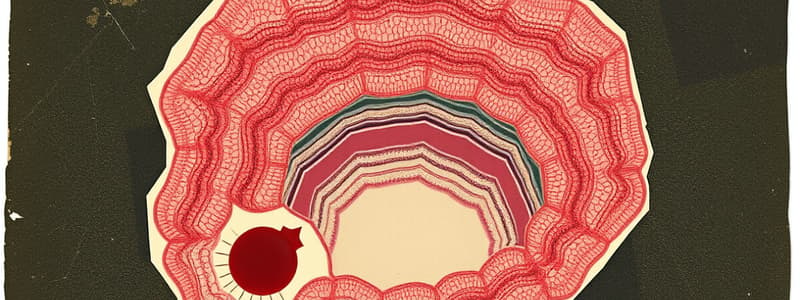Podcast
Questions and Answers
Match the type of epithelia with its special features:
Match the type of epithelia with its special features:
Exchange Epithelia = Pores between cells permit easy passage of molecules Transporting Epithelia = Tight junctions prevent movement between cells Ciliated Epithelia = One side covered with cilia Protective Epithelia = Cells tightly connected by many desmosomes
Match the type of epithelia with where it is found:
Match the type of epithelia with where it is found:
Exchange Epithelia = Lungs, lining of blood vessels Transporting Epithelia = Intestine, kidney Ciliated Epithelia = Nose, trachea, and upper airways Protective Epithelia = Skin and lining of cavities
Match the type of epithelia with the number of cell layers:
Match the type of epithelia with the number of cell layers:
Exchange Epithelia = One Transporting Epithelia = One Ciliated Epithelia = One Protective Epithelia = Many
Match the type of epithelia with its cell shape:
Match the type of epithelia with its cell shape:
Match the type of epithelia with its special cell features:
Match the type of epithelia with its special cell features:
Flashcards are hidden until you start studying
Study Notes
Types of Epithelia
-
Exchange Epithelia
- Composed of a single layer of flattened cells.
- Characterized by pores that facilitate the passage of molecules.
- Primarily located in the lungs and lining of blood vessels.
-
Transporting Epithelia
- Made up of a single layer of columnar or cuboidal cells.
- Features tight junctions that restrict movement between cells.
- Surface area is enhanced by the folding of the cell membrane into structures called villi.
- Commonly found in the intestine, kidney, and some exocrine glands.
-
Ciliated Epithelia
- Consists of a single layer of cuboidal to columnar cells.
- One side is equipped with cilia, which help in moving fluids across the surface.
- Typically found in the nose, trachea, upper airways, and female reproductive tract.
-
Protective Epithelia
- Consists of multiple layers of cells; surface layers are flattened while underlying layers are polygonal.
- Cells are tightly bonded by numerous desmosomes for structural integrity.
- Found in the skin and linings of cavities that open to the environment, such as the mouth.
-
Secretory Epithelia
- Can have one or multiple layers, composed of columnar to polygonal cells.
- Characterized by protein-secreting cells filled with membrane-bound secretory granules and extensive rough endoplasmic reticulum (RER).
- Steroid-secreting cells contain lipid droplets and extensive smooth endoplasmic reticulum (SER).
- Located in exocrine glands like pancreas, sweat, and salivary glands, as well as endocrine glands such as the thyroid and gonads.
Studying That Suits You
Use AI to generate personalized quizzes and flashcards to suit your learning preferences.



